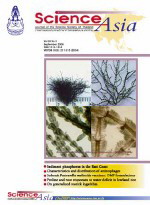ThaiScience
ThaiScience
SCIENCE ASIA
Volume 46, No. 02, Month FEBRUARY, Year 2020, Pages 195 - 205
Isolation, optimisation and gasoline biodegradation by lipopeptide-producing bacillus subtilis se1
Subuntith Nimrat, Somruetai Lookchan, Traimat Boonthai, Verapong Vuthiphandchai
Abstract Download PDF
Biosurfactant-producing bacteria were isolated from hydrocarbon contaminated soils. The highest surface and emulsification activities were achieved with a strain identified as Bacillus subtilis SE1. Optimal condition for biosurfactant production of B. subtilis SE1 included supplementation of glucose and yeast extract (10 g/l each) in the medium at 30 °C, initial pH 7.0 and no NaCl added, giving biosurfactant yield of 66.00 ± 1.54 mg/l. Biosurfactant produced by B. subtilis SE1 was characterised as lipopeptide and reduced the surface tension from 72.27 ± 0.01 to 25.95 ± 0.06 mN/m with a critical micelle concentration of 4.69 ± 0.11 mg/l. In a biodegradation assay, the experiment was conducted in 3 treatments for 7 days: gasoline-contaminated soil (T1); gasoline-contaminated soil with B. subtilis SE1 bioaugmentation (T2); and gasoline-contaminated soil with addition of B. subtilis SE1 and nutrients (glucose and yeast extract) (T3). The highest viable bacterial count (8.00 ± 0.04 log CFU/g) and percent reduction of total phenolic content (9.73 ± 1.13%) were observed in T3, which were significantly (p < 0.05) higher than those of T1 (5.60 ± 0.02 log CFU/g and 3.68 ± 0.83%) and T2 (7.12 ± 0.01 log CFU/g and 5.04 ± 0.30%). These results reveal the potential of biosurfactant-producing B. subtilis SE1 for use in bioremediation of hydrocarbon contaminated environment in Thailand.
Keywords
Bacillus subtilis, lipopeptide, biosurfactant, gasoline, biodegradationSCIENCE ASIA
Published by : The Science Society of Thailand
Contributions welcome at : http://www.scienceasia.org/
